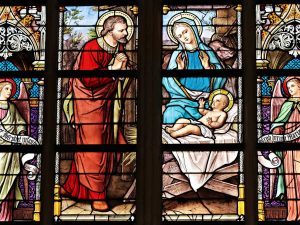Linda Brooks Davis | Let’s Chat | Epiphany
Welcome, everyone!
I hope you enjoyed a Christmas filled with warmth and laughter. May the Lord bless your 2022 with love, grace, and peace beginning today.
What is Epiphany?
 Since the 4th Century AD, January 6 has been the traditional date for Epiphany. The Roman Catholic and Eastern Orthodox churches celebrate the revelation of God incarnate as Jesus Christ on this feast day. In Western Christianity, it commemorates the visit of the Magi to the Christ Child, Jesus Christ’s physical manifestation to the Gentiles. The Protestant world doesn’t celebrate Epiphany widely. But some fellowships acknowledge and observe it. Because my roots extend deep into Southern Evangelical Protestant Christianity, other believers’ traditions and observances intrigue me.
Since the 4th Century AD, January 6 has been the traditional date for Epiphany. The Roman Catholic and Eastern Orthodox churches celebrate the revelation of God incarnate as Jesus Christ on this feast day. In Western Christianity, it commemorates the visit of the Magi to the Christ Child, Jesus Christ’s physical manifestation to the Gentiles. The Protestant world doesn’t celebrate Epiphany widely. But some fellowships acknowledge and observe it. Because my roots extend deep into Southern Evangelical Protestant Christianity, other believers’ traditions and observances intrigue me.
Where and when did Epiphany originate?
The festival originated in the Eastern church. At first it included a commemoration of Christ’s birth. By 354 AD Christians celebrated Christ’s birth in Rome on December 25. In the 4th century the church in Rome celebrated Epiphany on January 6.
In the Western church the festival primarily commemorates the Magi’s visit to the infant Jesus. This visit provides evidence that the Jewish Messiah came also for the salvation of Gentiles. In the East it primarily commemorates the baptism of Jesus and celebrates the revelation that the incarnate Christ was both fully God and fully man.
How does the West observe Epiphany?
 In the West, Twelfth Night arrives the evening before Epiphany. It tags the time between December 25 and January 6 as the Twelve Days of Christmas. Many countries celebrate Epiphany with special pastries. Children often receive small gifts in their shoes in honour of the Magi’s gifts to the infant Jesus.
In the West, Twelfth Night arrives the evening before Epiphany. It tags the time between December 25 and January 6 as the Twelve Days of Christmas. Many countries celebrate Epiphany with special pastries. Children often receive small gifts in their shoes in honour of the Magi’s gifts to the infant Jesus.
(Sources: https://www.britannica.com/topic/Epiphany and https://en.wikipedia.org/wiki/Epiphany_(holiday))
What good can observing Epiphany accomplish?
The Bible teaches that God breathes inspiration into Holy Scripture. Therefore, the Word provides everything needed to know God and to be thoroughly equipped to serve Him.
16All Scripture is God-breathed and is useful for teaching, rebuking, correcting and training in righteousness,
17 so that the servant of God may be thoroughly equipped for every good work.
2 Timothy 3:16-17
The New Testament makes no mention of Epiphany. Nor does it establish Epiphany as a special day for Christians to commemorate. Does that mean believers must avoid Epiphany completely? I’m a simple, Bible-loving Christian woman. I strive to “speak where the Bible speaks and be silent where the Bible is silent.” So I tremble at the thought of speaking where I find no such authority. Or venturing into subjects I know nothing about. Or going beyond what the Lord allows in any arena. Does God’s Word provide believers the freedom to observe special days with thanksgiving for the glory of God and the good of others?
1 Corinthians 10
30 If I take part in the meal with thankfulness, why am I denounced because of something I thank God for? 31 So whether you eat or drink or whatever you do, do it all for the glory of God. 32 Do not cause anyone to stumble, whether Jews, Greeks or the church of God— 33 even as I try to please everyone in every way. For I am not seeking my own good but the good of many, so that they may be saved. For why is my freedom being judged by another’s conscience?
Epiphany Reconsidered
 Might you start a family tradition for Epiphany? Perhaps fix a special meal where the family thanks God for their blessings. And where you offer gratitude for the freedom to set aside certain days and seasons to glorify Him in special ways. How about a unique day on which your family follows the example of the Wise Men? Make a special contribution to an evangelical or child welfare ministry. Or close out the Christmas season with a small January 6 event. Offering simple gifts to needy children, a “Thanksgiving in January” event, sets a cherry atop Christmas’s Red Velvet Cake.
Might you start a family tradition for Epiphany? Perhaps fix a special meal where the family thanks God for their blessings. And where you offer gratitude for the freedom to set aside certain days and seasons to glorify Him in special ways. How about a unique day on which your family follows the example of the Wise Men? Make a special contribution to an evangelical or child welfare ministry. Or close out the Christmas season with a small January 6 event. Offering simple gifts to needy children, a “Thanksgiving in January” event, sets a cherry atop Christmas’s Red Velvet Cake.~ For Jesus’ sake ~


Linda, I love your idea to celebrate Epiphany. We’ve never done so in my family, but I think we will next year.
Have a blessed 2022.